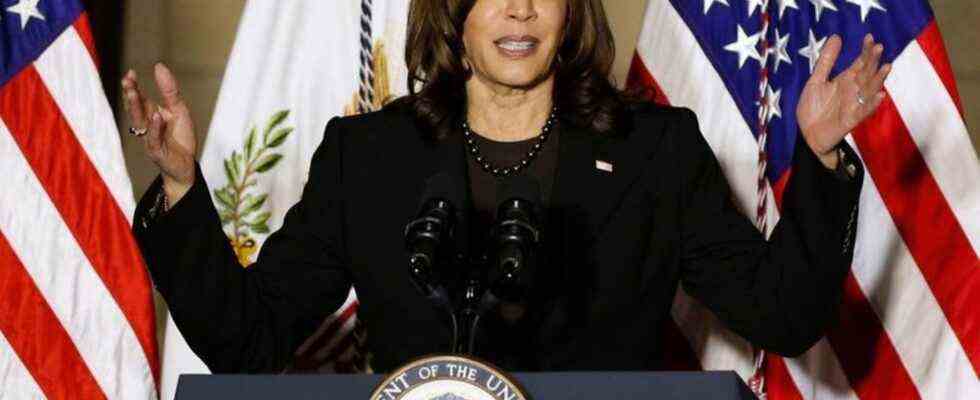Renowned expert meeting
Scholz and Harris expected at the Munich Security Conference
Kamala Harris is expected at the Munich Security Conference in mid-February. (Archive image) Photo: Jay Laprete/ AP/dpa
© dpa-infocom GmbH
The Munich Security Conference defies Omicron. The renowned expert meeting will take place in February under strict conditions and with only a few participants. Some prominent guests have already confirmed.
US Vice President Kamala Harris will probably take part in the Munich Security Conference in mid-February together with Chancellor Olaf Scholz and around 35 other heads of state and government.
“I’m actually assuming that the US Vice President will attend, even if that hasn’t been formally confirmed,” said conference leader Wolfgang Ischinger of the German Press Agency. In addition to Harris and Scholz, Ukrainian President Volodymyr Zelenskyy, NATO Secretary General Jens Stoltenberg and EU Commission President Ursula von der Leyen are also expected to attend the world’s most important meeting of security policy experts from February 18th to 20th.
According to Ischinger, Russian President Vladimir Putin has already rejected physical participation. However, it cannot be ruled out that he will speak up virtually. “I definitely don’t want to exclude Russia. It is now up to Moscow to seize the opportunity not only to present the Russian perspective through letters from the US and NATO, but also to explain it once more to a knowledgeable and high-level audience.”
2021 as a virtual meeting
The security conference only took place virtually last year due to the corona pandemic. Despite the Omicron wave, Ischinger decided against cancellation this year. He justifies this with the enormous need for personal encounters in the security policy scene. “Such talks, which are actually part of the daily bread of crisis diplomacy, have hardly been possible in the last two years,” he said. “That has led to a certain blockade of international crisis diplomacy.”
The event in the luxury hotel Bayerischer Hof takes place under strict conditions. Instead of the usual more than 2000 participants, this time only 600 are admitted. “We will even fall well below this number to show that we absolutely do not want to take any risks,” said Ischinger. Each participant must take a daily PCR test, all participants must be vaccinated.
The number of observers is also limited. “Personally, my heart bleeds when I think that we could not invite hundreds of journalists this year.” However, there will be the opportunity to follow the conference virtually.
Scholz will present the foreign policy of the new federal government in Munich. Foreign Minister Annalena Baerbock (Greens), Defense Minister Christine Lambrecht (SPD), Development Minister Svenja Schulze (SPD) and Chancellor Wolfgang Schmidt are also expected at the security conference.
Around 100 ministers expected in Munich
30 members of Congress have announced their attendance from the USA. Foreign Minister Antony Blinken is also expected. It is not yet clear whether French President Emmanuel Macron will also come to Munich. “That has not yet been finally decided in the Elysée Palace,” said Ischinger. According to him, China will be represented by Foreign Minister Wang Yi. “Whether physical or virtual is still open.” Overall, Ischinger expects around 100 ministers in Munich.
For Ischinger it will be the last security conference as leader. He will then be replaced by Chancellor Angela Merkel’s former adviser, Christoph Heusgen. In the 14 years of his tenure there have been many crises including the financial crisis, the Syrian war, the 2014 annexation of Crimea and the migration crisis, said the 75-year-old former top diplomat. The upcoming conference is still the most important for him. “Never have so many crises hit world politics as now,” he said. “That’s why, despite the most difficult framework conditions, we are sticking to the project of enabling a physical encounter between decision-makers in security policy again.”

